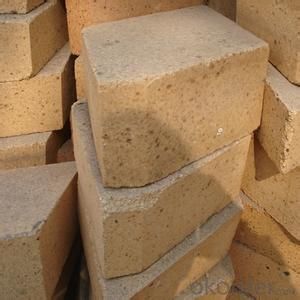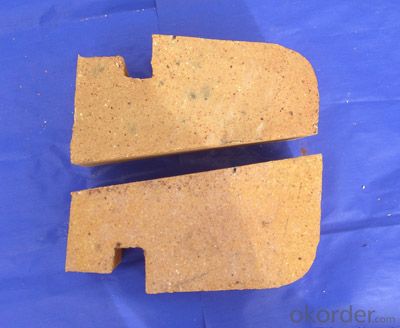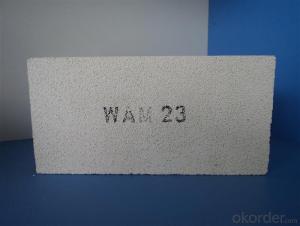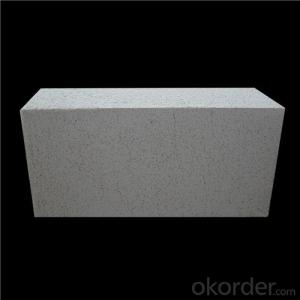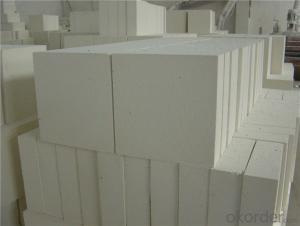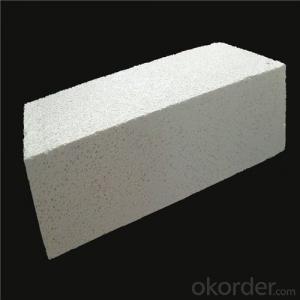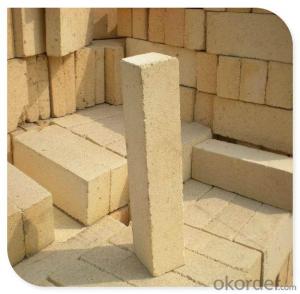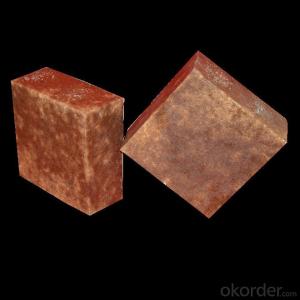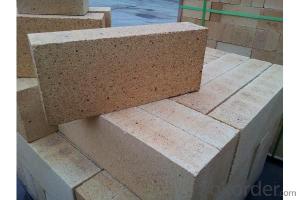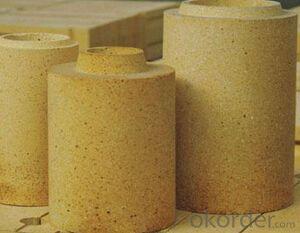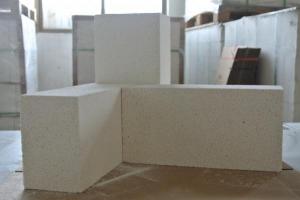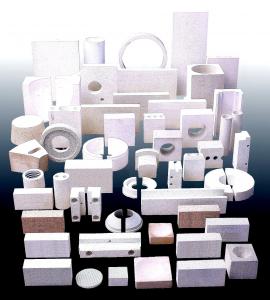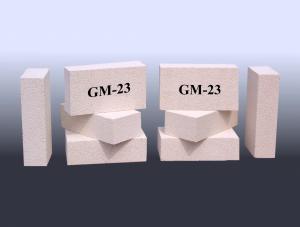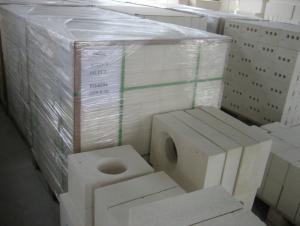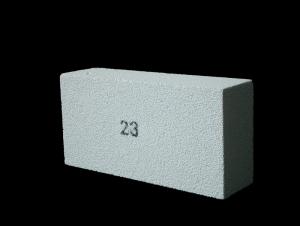Insulating Fire Brick for Hot Blast Stove Refractory Applications
- Loading Port:
- China Main Port
- Payment Terms:
- TT OR LC
- Min Order Qty:
- -
- Supply Capability:
- -
OKorder Service Pledge
OKorder Financial Service
You Might Also Like
Specifications
Fire brick1.ISO 9001 approved,
2.With high quality and competitive price,
3.Standard and special shape.
Fire-clay refractory brick.
1. N-1
AL2O3 (%)>42
Refractoriness >1750
Refractoriness under load KD>1400
Permanent linear change onreheating
1500*2h
1450*2h
1400*2h:+0.1; -0.4
Apparent Porosity(%)<22
Cold crushing strength (Mpa)>29.4
2. N-2a
AL2O3 (%)>40
Refractoriness >1730
Refractoriness under load KD>1350
Permanent linear change onreheating
1500*2h
1450*2h
1400*2h:+0.1; -0.5
Apparent Porosity(%)<24
Cold crushing strength (Mpa)>24.5
High-alumina refractory brick
1. LZ-75
AL2O3 (%)>75
Refractoriness>1790
Refractoriness under load KD>1520
Permanent linear change onreheating
1500*2h:+0.1; -0.4
1450*2h
1400*2h
Apparent Porosity(%)<23
Cold crushing strength (Mpa)>53.9
2. LZ-65
AL2O3 (%)>65
Refractoriness >1790
Refractoriness under load KD>1500
Permanent linear change onreheating
1500*2h:+0.1; -0.4
1450*2h
1400*2h
Apparent Porosity(%)<23
Cold crushing strength (Mpa)>49
3.LZ-55
AL2O3 (%)>55
Refractoriness >1770
Refractoriness under load KD>1470
Permanent linear change onreheating
1500*2h:+0.1; -0.4
1450*2h
1400*2h
Apparent Porosity(%)<22
Cold crushing strength (Mpa)>44.1
4.LZ-48
AL2O3 (%)>48
Refractoriness >1750
Refractoriness under load KD>1420
Permanent linear change onreheating
1500*2h
1450*2h:+0.1; -0.4
1400*2h
Apparent Porosity(%)<22
Cold crushing strength (Mpa)>39.2
Fire clay brick SK-32 | |
Item | Standard |
AI2O3(%) | 30 |
Fe2O3 (%) | 3.5 |
Refractoriness (SK) | 32 |
Refractoriness under load, 0.2MPa, Ta, (°C) | 1300 |
Porosity (%) | 22-26 |
Bulk density (g/cm³) | 2.05 |
Cold crushing strength (MPa) | 25 |
Thermal expansion at 1000°C (%) | 0.6 |
Fire clay brick SK-34 | |
Item | Standard |
AI2O3(%) | 38 |
Fe2O3 (%) | 2.5 |
Refractoriness (SK) | 34 |
Refractoriness under load, 0.2MPa, Ta, (°C) | 1350 |
Porosity (%) | 19-23 |
Bulk density (g/cm³) | 2.10-2.15 |
Cold crushing strength (MPa) | 25 |
Thermal expansion at 1000°C (%) | 0.6 |
Fire clay brick SK-36 | |
Item | Standard |
AI2O3(%) | 50 |
Fe2O3 (%) | 2 |
Refractoriness (SK) | 36 |
Refractoriness under load, 0.2MPa, Ta, (°C) | 1450 |
Porosity (%) | 20-24 |
Bulk density (g/cm³) | 2.30-2.40 |
Cold crushing strength (MPa) | 45 |
Thermal expansion at 1000°C (%) | 0.3 |
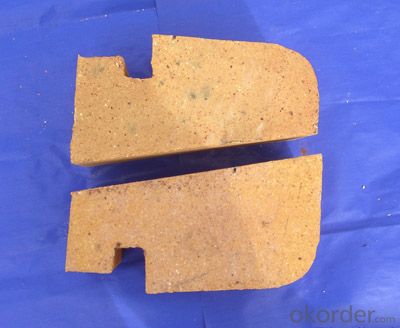
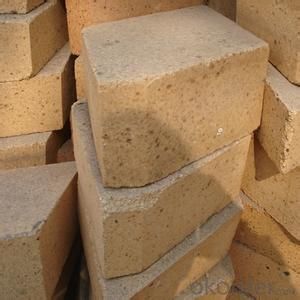
- Q: Do insulating fire bricks have low thermal conductivity?
- Yes, insulating fire bricks have low thermal conductivity. These bricks are specifically designed to minimize heat loss and provide excellent insulation properties. The low thermal conductivity of insulating fire bricks is due to their composition, which typically includes lightweight materials such as clay, silica, and alumina. These materials have low thermal conductivity, meaning they are not efficient at transferring heat. As a result, insulating fire bricks are highly effective at reducing heat transfer and maintaining high temperatures within a structure. This makes them ideal for applications that require insulation against high temperatures, such as in kilns, furnaces, and fireplaces.
- Q: Can insulating fire bricks be used in residential applications, such as fireplaces or ovens?
- Residential applications like fireplaces or ovens can indeed utilize insulating fire bricks. These bricks are specifically designed for enduring high temperatures and providing outstanding thermal insulation. They are crafted from lightweight materials like clay or alumina, which possess low thermal conductivity. This attribute assists in retaining the heat within the fireplace or oven, enhancing efficiency and reducing energy consumption. Moreover, insulating fire bricks exhibit exceptional resilience against thermal shock, enabling them to withstand sudden temperature fluctuations without cracking or breaking. Additionally, these bricks are non-combustible, ensuring they can withstand the intense temperatures produced in fireplaces or ovens without posing a fire hazard. Consequently, insulating fire bricks are a suitable option for residential applications requiring high temperatures and thermal insulation.
- Q: Do insulating fire bricks require a specific curing or drying process before use?
- Yes, insulating fire bricks typically require a specific curing or drying process before use. This is done to remove any moisture or volatile organic compounds (VOCs) that may be present in the bricks, as well as to ensure they achieve their maximum insulating properties. The curing or drying process for insulating fire bricks usually involves slowly heating the bricks to gradually increase their temperature. This allows any moisture or VOCs to be released without causing any cracks or damage to the bricks. The rate of temperature increase and the overall duration of the curing process can vary depending on the type and thickness of the bricks. It is important to follow the manufacturer's instructions and recommendations for the specific type of insulating fire bricks being used. This will ensure that the curing or drying process is carried out correctly and that the bricks are ready for use in high-temperature applications such as kilns, furnaces, or fireplaces. Neglecting to properly cure or dry the bricks may result in reduced insulating properties and potential cracking or failure of the bricks when exposed to high temperatures.
- Q: Are insulating fire bricks resistant to alkali-silica reaction?
- IFBs do not possess inherent resistance against alkali-silica reaction (ASR), which is a chemical reaction occurring between the alkalis from cement and reactive forms of silica found in aggregates. This reaction can result in the formation of a gel that expands and causes cracks in concrete structures. Although IFBs are typically constructed from refractory materials engineered to withstand high temperatures and thermal shock, they lack specific properties to combat ASR. The refractory material's composition and characteristics determine its resistance to ASR when used in IFBs. Should the refractory material utilized in an IFB contain reactive forms of silica like quartz or cristobalite, and there is exposure to alkalis, the possibility of ASR occurring exists. However, if the refractory material has a low content of reactive silica or contains additives that can mitigate ASR, the risk of ASR can be minimized. It is essential to recognize that the primary function of IFBs is to provide insulation in high-temperature applications, such as kilns, furnaces, and fireplaces. If ASR resistance is a crucial requirement for a specific application, it is advisable to consult the manufacturer or a materials engineer to determine the suitability of the IFB for that particular scenario.
- Q: Do insulating fire bricks require a refractory mortar for installation?
- Yes, insulating fire bricks typically require a refractory mortar for proper installation. Insulating fire bricks are lightweight and have high insulating properties, making them ideal for applications where thermal efficiency is important. However, due to their lightweight nature, they can be more fragile and prone to cracking or breaking under stress. Using a refractory mortar specifically designed for high-temperature applications helps ensure a strong and durable bond between the bricks. Refractory mortars are formulated to withstand high temperatures and provide excellent adhesion and thermal expansion properties. This mortar helps to create a solid and secure structure by filling in gaps between the bricks and providing additional support. Without the use of refractory mortar, insulating fire bricks may not be properly secured and could shift or separate over time, compromising the integrity of the installation. Additionally, the absence of refractory mortar may result in reduced thermal efficiency due to increased heat loss through gaps and spaces between the bricks. Therefore, it is highly recommended to use a refractory mortar when installing insulating fire bricks to ensure a strong and long-lasting construction.
- Q: Are insulating fire bricks suitable for use in boilers?
- Boilers can indeed utilize insulating fire bricks. With their ability to withstand high temperatures, insulating fire bricks prove themselves as a viable option for a range of applications, including boilers. These bricks are crafted from lightweight materials like ceramic fibers or vermiculite, imparting exceptional thermal insulation properties. Consequently, they proficiently trap heat within the boiler, curbing heat loss and enhancing energy efficiency. Furthermore, insulating fire bricks exhibit resilience against thermal shock, chemical attack, and corrosion, ensuring their endurance and longevity in boiler settings. In summary, incorporating insulating fire bricks in boilers can optimize performance, decrease energy consumption, and elevate the overall efficiency of the heating system.
- Q: Are insulating fire bricks resistant to phosphorus pentoxide?
- Insulating fire bricks are generally not resistant to phosphorus pentoxide. Phosphorus pentoxide is a highly reactive compound that can corrode and degrade most materials, including insulating fire bricks. It is important to consider alternative materials or protective coatings if there is a need for resistance to phosphorus pentoxide in a specific application.
- Q: Can insulating fire bricks be used in the construction of regenerators?
- Yes, insulating fire bricks can be used in the construction of regenerators. These bricks are designed to have low thermal conductivity, which makes them suitable for applications that require heat insulation. Regenerators, which are used in various industries like glass manufacturing and metal refining, require materials that can withstand high temperatures and efficiently store and release heat. Insulating fire bricks can fulfill these requirements, making them a suitable choice for regenerator construction.
- Q: Are insulating fire bricks resistant to acids and alkalis?
- Insulating fire bricks are generally resistant to acids and alkalis, but the level of resistance can vary depending on the specific composition and manufacturing process of the bricks. Insulating fire bricks are typically made from materials such as alumina, silica, or a combination of both, which provide excellent resistance to high temperatures and thermal conductivity. These materials are generally chemically inert, meaning they do not react with acids or alkalis. However, it is important to note that some acids and alkalis can still cause slight degradation or corrosion over time, especially if they are highly concentrated or used at elevated temperatures. In such cases, it is advisable to consult the manufacturer's specifications or conduct specific tests to determine the level of resistance of the insulating fire bricks to the particular acids or alkalis in question. Overall, insulating fire bricks are a suitable choice for applications that involve exposure to acids and alkalis, but it is always recommended to consider the specific requirements and consult with experts or manufacturers to ensure the bricks will perform adequately in the intended environment.
- Q: Can insulating fire bricks be used in waste incineration plants?
- Insulating fire bricks are indeed applicable in waste incineration plants. Their ability to endure high temperatures renders them suitable for the exceedingly hot surroundings found in these plants. These bricks are crafted from lightweight materials that possess exceptional thermal insulation properties, thus aiding in minimizing heat loss and enhancing energy efficiency during the incineration procedure. Moreover, insulating fire bricks exhibit commendable resistance to both chemical and thermal shock, a crucial attribute in waste incineration plants where diverse waste materials are combusted. Overall, the incorporation of insulating fire bricks in waste incineration plants contributes to heightened insulation, increased energy efficiency, and enhanced incineration process performance.
Send your message to us
Insulating Fire Brick for Hot Blast Stove Refractory Applications
- Loading Port:
- China Main Port
- Payment Terms:
- TT OR LC
- Min Order Qty:
- -
- Supply Capability:
- -
OKorder Service Pledge
OKorder Financial Service
Similar products
Hot products
Hot Searches
Related keywords



